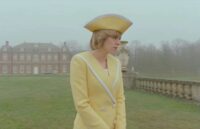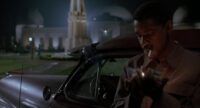In 2002 Adam Curtis produced a documentary series, The Century Of The Self. It was primarily about psychoanalysis and PR working to control crowds who can be dangerous in a time of mass democracy. ‘Warning’ absolutely knows this.
Of course, that is now managed nicely by social media. This is truly the time of The Self. If psychoanalysis and PR focused on you, the consumer, social media allows it to be concentrated on you entirely. This is the real Self, you are your own editor, news outlet, commentator. You may have read a newspaper in the past and talked about views with your mates. They might have argued with you, which may have made you change your mind or sway them with your debating skills. The algorithms don’t allow that now. You will find info you tend to agree with and share it or comment to followers who agree with you. It’s comfortable. Hence the outrage when someone puts a contrary view. It’s a commonly used trope that when combined with the ‘you get likes but do they really like you?’ line. Some may say that makes Agata Alexander’s film Warning a bit old hat. It doesn’t. This is eminently now.
The film has a series of stories, plot strands, scenarios which generally have no overarching theme. Some do. Some don’t, and why should they? We live our lives in a short term, ‘here today dropped tomorrow’ way. There’s no upbraiding here, by the way, I’m driven by speed to do more and more. Social media and the Internet has made that possible. And it disconnects me whilst settling me into myself.
So in Warning we have a story of an AI human animal shelter. Charlie, a non-human human companion, just wants to be connected to the right family and his handler is desperate to find him one. Meanwhile, an Alexa-like ‘God 2.0’ malfunctions and leaves its consumer having to live her own life, how to pray, how to believe, how to be. EM Forster implored us to ‘only connect’ and that rings true in ‘Warning’ as virtual reality headsets are used in the story of a couple either falling apart or not there are all. One of the saddest tales here, we are left to decide whether the virtual reality ruined the relationship or created it.
People use their machines as buffers to interaction, when Claire discusses her problems with the God 2.0, she doesn’t know how to phrase the query and the salesman doesn’t know how to help her. Some have been concerned about the unconnected plot strands in ‘Warning’, but no one caviled about Altman’s Short Cuts or Todd Solondz’s Happiness. There are also elements of thriller, comedy existential anxiety and sci fi, theyre just not tied up with a bow. There’s a feeling in this movie that the other shoe is about to drop, a sense of looking over our shoulder and that communicating with others, dealing with things ourselves, is absolutely the worst thing that could happen.
The whole shebang appears to have been caused by an electrical problem in a satellite. This banishes astronaut David, played by Thomas Jane as a blank canvas, to the depths of space. It allows him time with no distractions to come between him and the him he doesn’t visit much. ‘Warning’ plays this as a discovery rather than a disaster. As he says; ‘I’m on my own, I’m not lonely’.
Alice Eve, who plays Claire, the God 2.0 acolyte, told screen rant; ‘…today, for example, I have spent most of the day talking to people on a computer. And, you know, it’s a life that is ultimately isolated’. It’s also a new window on the world. Alex Pettyfer, Liam in the film, has praised Alexander’s ability to hold the narratives she creates and that’s absolutely right. There is no concern that things will fall apart, the stories are there because they are there and they provide just what they need to. They work together because they are in the same film.
And there are some great performances in Warning; Rupert Everett as Charlie has a lean and hungry look, with a stoop which gives him the posture of a vulture, after the next chance. It’s a big performance and I could have done with more of it. Eve is sweetly confused in this Beckettian world of no God v corporate God, but there are a fine performances throughout. There are directorial flourishes here too, from a Cronenbergian umbilical cord body-to-body transplant, to the boxes we keep seeing the world through. Just like the the monitors we see the world through, always filtered. The internet, which should have opened things up for us, curtailed and squeezed by capitalism.
Alexander herself says in her production notes; ‘Even though technology may have reached new heights, it hasn’t made us better and our emotional state is still the same.’ Black Mirror is mentioned regularly in info about this movie but there is no archness here. There is expansiveness and a hope that we can connect, even in the midst of an emergency broadcast. The uncompromising feeling is impressive for a first time feature director. And when you hear the last line of the film, you’ll surely agree with its frustration. We don’t have flying cars, as Alexander reminds us, the world is not as free or beautiful as we imagined. Some will want these stories to be connected. But life isn’t.



